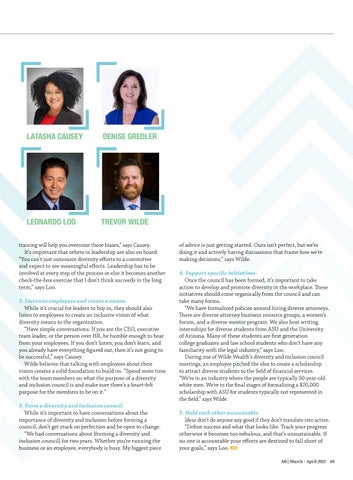LATASHA CAUSEY
DENISE GREDLER
LEONARDO LOO
TREVOR WILDE
training will help you overcome those biases,” says Causey. It’s important that others in leadership are also on board. “You can’t just outsource diversity efforts to a committee and expect to see meaningful effects. Leadership has to be involved at every step of the process or else it becomes another check-the-box exercise that I don’t think succeeds in the long term,” says Loo. 2. Listen to employees and create a vision. While it’s crucial for leaders to buy in, they should also listen to employees to create an inclusive vision of what diversity means to the organization. “Have simple conversations. If you are the CEO, executive team leader, or the person over HR, be humble enough to hear from your employees. If you don’t listen, you don’t learn, and you already have everything figured out, then it’s not going to be successful,” says Causey. Wilde believes that talking with employees about their vision creates a solid foundation to build on. “Spend more time with the team members on what the purpose of a diversity and inclusion council is and make sure there’s a heart-felt purpose for the members to be on it.” 3. Form a diversity and inclusion council. While it’s important to have conversations about the importance of diversity and inclusion before forming a council, don’t get stuck on perfection and be open to change. “We had conversations about [forming a diversity and inclusion council] for two years. Whether you’re running the business or an employee, everybody is busy. My biggest piece
of advice is just getting started. Ours isn’t perfect, but we’re doing it and actively having discussions that frame how we’re making decisions,” says Wilde. 4. Support specific initiatives. Once the council has been formed, it’s important to take action to develop and promote diversity in the workplace. These initiatives should come organically from the council and can take many forms. “We have formalized policies around hiring diverse attorneys. There are diverse attorney business resource groups, a women’s forum, and a diverse mentor program. We also host writing internships for diverse students from ASU and the University of Arizona. Many of these students are first generation college graduates and law school students who don’t have any familiarity with the legal industry,” says Loo. During one of Wilde Wealth’s diversity and inclusion council meetings, an employee pitched the idea to create a scholarship to attract diverse students to the field of financial services. “We’re in an industry where the people are typically 50-year-old white men. We’re in the final stages of formalizing a $20,000 scholarship with ASU for students typically not represented in the field,” says Wilde. 5. Hold each other accountable. Ideas don’t do anyone any good if they don’t translate into action. “Define success and what that looks like. Track your progress otherwise it becomes too nebulous, and that’s unsustainable. If no one is accountable your efforts are destined to fall short of your goals,” says Loo. AB | March - April 2021 49
